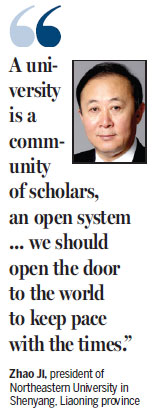Insisting on a combination of innovation and tradition is what helped Northeastern University gain recognition in the 2016-17 World University Rankings published by Times Higher Education last week, according to Zhao Ji, the university's president.
"A university is a community of scholars, an open system," Zhao said. "Therefore, as a university, we should open the door to the world to keep pace with the times.
"At the same time, a university is the best system for passing down cultural traditions. Every university is unique, with its own character, but should maintain a balance between innovation and inheritance. We can also show the charm of Chinese culture and absorb the essence of foreign culture through exchanges with different countries."
Northeastern is making its first appearance in the rankings, sitting in 22nd place among the 52 Chinese mainland universities listed.
Founded in 1923 in Shenyang, Liaoning province, NEU is one of the national key universities under the direct administration of the Ministry of Education. It has a strong discipline structure and maintains a leading national position in many sections, including scientific research and teaching of metallurgy, mechanical engineering, automation and biomedical engineering.

With its policy of being open to the world, NEU has established long-term stable academic cooperation with 198 universities and institutions in 34 countries and regions. More than 300 well-known overseas experts are invited to give lectures or participate in cooperative scientific research projects annually.
Nearly 700 NEU faculty members and more than 500 students participate in various international academic exchange programs each year. In 2015, there were 1,233 foreign students from 78 countries and regions at NEU for academic exchanges.
"There are four main characteristics of NEU'S internationalization," Zhao said. "First, we are developing fast. Second, internationalization has infiltrated many fields. Third, our internationalization has geographical features, with emphasis on Northeast Asia. Finally, we have a great deal of international cooperation in our courses, teaching materials, teaching resources and scientific research."
"Although NEU is behind when compared with many globally famous universities, we are on the way."
According to Zhao, the number of overseas students will reach 3,000 in the future, accounting for 10 percent of all students, which signals a high degree of internationalization.
"The internationalization of higher education is the inevitable outcome of economic globalization," Zhao said. "But universities with higher internationalization levels around the world don't give up their own traditions.
"Moreover, the internationalization of universities cannot follow the same model everywhere. It should have its own path in line with each nation's and university's situation. We cannot measure internationalization by any single index. However, there are some key points, such as educational philosophy and the number of international students, and teachers that can reflect the degree of internationalization."
To achieve its goals, NEU is using more international evaluation criteria for teachers. The proportion of teachers with overseas exchange experience will be increased.
Also, the university will expand its cooperation with foreign universities, especially on student exchange projects.
And it is building more exchange platforms. For example, NEU will hold a Sino-Japan forum and take part in an Asian university forum next year.
"We will keep an open mind to the world and actively embrace the world," Zhao said.
